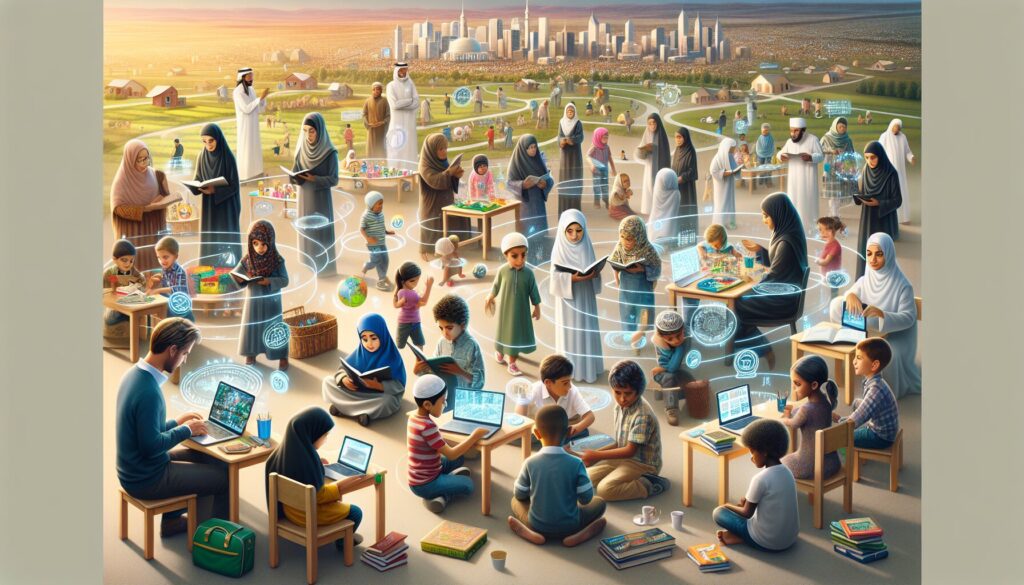Hey there! So, when I was a kid, my grandma used to gather all of us around every Friday evening and share stories from the Quran. She had this magical way of making those tales come alive. I remember the story of the Prophet Yusuf and his colorful coat, which got us all excited and eager to learn more. Fast forward to today, and I’ve realized how vital it is to introduce our little ones to Islamic learning in a way that’s both engaging and meaningful. For families in the UK, there’s a wonderful mix of cultures and experiences, making it a perfect place to explore and enhance kids’ Islamic learning in 2025 with modern tools and methods.
Incorporating Technology into Islamic Education
Incorporating technology into your child’s Islamic education can be a game-changer! Remember when we were kids, and the most exciting thing in class was the overhead projector? Well, times have changed, and your little ones in the UK have access to a world of learning possibilities right at their fingertips. With a few thoughtful steps, you can harness these digital tools to enhance kids’ Islamic learning in 2025.
First, consider integrating educational apps that offer interactive experiences. These apps can transform learning into an engaging journey. For instance, there are apps that allow children to explore stories of the Prophets in a colorful, animated format. This makes the stories relatable and memorable. Apps like these can be found on platforms like Apple App Store or Google Play Store, and many come with parental controls to ensure a safe learning environment.
Utilize Online Learning Platforms
Online platforms are a treasure trove of resources for Islamic education. Websites such as Bayyinah and Quranic offer courses that kids can follow at their own pace. They often include videos, quizzes, and community forums where learners can discuss and exchange ideas. This not only makes learning more interactive but also provides a sense of belonging to a community of learners.
Another great tool is video content. Channels dedicated to Islamic education, available on platforms like YouTube, can offer everything from recitations of the Quran to animated stories about historical figures. These can be fantastic for visual learners who benefit from seeing concepts in action.
Virtual reality (VR) is another emerging technology that can enrich Islamic education. Imagine your child taking a virtual tour of historically significant mosques or experiencing life in ancient times. These VR experiences foster a deeper understanding and connection with Islamic history and culture.
However, it’s important to ensure that screen time is balanced with other activities. Encourage your child to discuss what they’ve learned with family or friends. This not only reinforces their learning but also develops their communication skills.
Don’t underestimate the power of e-books and audiobooks. They offer flexibility and accessibility, allowing children to dive into stories or lessons during commutes or before bedtime. Many of these resources are available through Audible or Kindle, providing a vast library of Islamic literature right at your fingertips.
Interactive and Engaging Teaching Methods
Interactive and engaging teaching methods can truly revolutionize the way kids learn about Islam in 2025! Imagine turning your living room into an immersive classroom where the walls tell stories and the floor transforms into a map of ancient Islamic empires. With the right approach, learning can become a thrilling adventure for young minds.
One of the most exciting ways to captivate kids’ attention is by incorporating technology into lessons. Virtual reality can transport them to significant Islamic sites, making history come alive. Imagine your child walking through the bustling streets of ancient Baghdad or exploring the majestic architecture of Alhambra, all from the comfort of your home. This type of experiential learning not only holds their attention but also deepens their understanding of Islamic heritage.
Additionally, interactive applications can make Quranic learning more engaging. Apps that offer games, quizzes, and storytelling sessions can turn what might seem like a daunting task into a fun and rewarding experience. For instance, learning about the life of Prophet Yusuf can be transformed into a captivating storybook format, where each chapter reveals new lessons and adventures. This approach ensures that kids are not just passive listeners but active participants in their learning journey.
Group Activities and Creative Projects
Another powerful method is through group activities and creative projects. Kids often learn best when they’re interacting with others. Set up a weekly storytelling circle where children can share tales from Islamic history. This not only enhances their public speaking skills but also fosters a sense of community. Moreover, organizing art and craft sessions focused on Islamic themes can unleash their creativity. Picture them creating beautiful mosaics inspired by Islamic art or crafting models of historical mosques.
Furthermore, involving kids in role-playing activities can be incredibly effective. They could take on the roles of historical figures or even recreate significant events. This kind of hands-on experience can make lessons memorable and help retain important information.
Collaborating with organizations like Islamic Relief UK or Muslim Council of Britain can provide additional resources and support for these activities. They often have educational materials and programs tailored for young learners that can supplement your efforts. Plus, exploring resources from Bayyinah Institute can give you fresh ideas for making Islamic education more exciting.
For more creative ideas, check out our guide on Islamic story activities. Creating a dynamic learning environment not only enhances kids’ Islamic learning but also instills a lifelong love for exploring their rich heritage.
Role of Parents in Supporting Islamic Learning
When it comes to enhancing kids’ Islamic learning in 2025, parents play such a pivotal role. I remember when I was a kid, my mum would gather us around in the living room on Friday evenings. We’d have these cozy little sessions where she’d share stories about the Prophet Yusuf. It wasn’t just about the learning; it was about creating a nurturing environment filled with love and curiosity. Those evenings sparked a lifelong interest in understanding our faith deeply, and I believe every parent has the power to create similar moments for their children.
Parents in the UK can significantly influence their children’s Islamic education by integrating learning into everyday life. Imagine turning a simple walk in a park into a lesson about gratitude for nature and the wonders of creation. This approach helps children connect real-world experiences with their religious teachings, reinforcing their understanding and appreciation.
Practical Ways to Support Islamic Learning
To support your child’s Islamic learning journey, consider the following strategies:
- Engage with Technology: Embrace the latest tools like virtual reality to make learning immersive and fun. For instance, exploring the Alhambra through a VR tour can offer a unique perspective on Islamic art and architecture.
- Community Involvement: Participate in local events organized by institutions like Islamic Relief UK. These gatherings not only offer learning opportunities but also help children feel part of a larger community.
- Consistent Routine: Establish a regular schedule for Quranic studies, perhaps using resources from Bayyinah, which can provide structured and engaging content for kids.
Moreover, fostering a supportive home environment is crucial. Encourage open discussions about faith and let your kids ask questions. Dive into those conversations without hesitation. This openness builds trust and allows them to explore their beliefs with confidence. Also, celebrating Islamic festivals together and incorporating prayers into daily life can reinforce their understanding and make learning a natural part of their routine.
Parents should lead by example. Kids learn a lot by observing. Show them how you incorporate Islamic principles in your daily life, whether it’s through charitable acts or maintaining integrity in your actions. Organizations like Islamic Relief UK can offer volunteer opportunities that you can partake in together, making them see firsthand the values of compassion and community service.
Community Resources and Support Networks

When it comes to enhancing kids’ Islamic learning in 2025, tapping into community resources and support networks is a game-changer. The UK is brimming with vibrant communities that are eager to help nurture young minds. Let’s dive into some of the incredible resources available.
Local mosques are often the heart of community life, offering much more than just a place of worship. Many mosques host weekend schools or after-school programs focused on Islamic studies. These programs not only provide structured learning but also create a sense of belonging among children. Plus, they get to make friends who share similar values, which is so important for their social development.
Invaluable Community Programs
Community centers and organizations like Islamic Relief UK often offer workshops and seminars tailored for young learners. These events cover a wide range of topics, from the stories of the Prophets to understanding the significance of Islamic art and architecture. Engaging in these activities provides kids with a broader perspective and deeper appreciation of their heritage.
Moreover, storytelling sessions are becoming a popular method to captivate children’s attention. Imagine kids sitting in a circle, listening to enchanting tales of figures like Prophet Yusuf. These stories not only entertain but also impart valuable life lessons. Organizations like Bayyinah often collaborate with community groups to bring such experiences to life, making learning both educational and fun.
Libraries are another treasure trove of resources. Many libraries stock a range of books on Islamic history and culture, perfect for young readers. Some even host reading clubs or themed events during special occasions like Ramadan. Encouraging kids to participate in these can significantly boost their interest in learning about Islam.
Don’t forget about online communities and forums. They offer a platform for parents to exchange ideas, share resources, and support each other in their educational journeys. Websites like Quranic provide valuable tools and interactive content that can be used at home to complement what kids learn in their community programs.
Virtual reality is making waves in education, offering immersive experiences that are both educational and entertaining. Imagine strolling through the majestic Alhambra or exploring ancient Islamic civilizations without leaving your living room. These technologies can make learning an adventure, sparking curiosity and a love for knowledge.
By leveraging these community resources and support networks, parents and educators can create a rich and engaging learning environment for children. Such an approach not only enhances kids’ Islamic learning in 2025 but also builds a strong foundation for their future.
Adapting to New Trends in 2025
Adapting to the constantly changing trends in 2025 requires a keen eye on technology and lifestyle shifts. Kids today are growing up with so much more than we did, right? It’s crucial to tap into these advancements to enhance their Islamic learning experiences. The UK is particularly vibrant when it comes to tech integration in education, and it’s fascinating to see how this can be applied to Islamic learning.
First off, let’s talk about virtual reality. Imagine your child experiencing the Alhambra, not just as a picture in a book, but as an immersive environment they can explore. They can walk through its halls, admire the intricate arabesques, and feel the history. This isn’t just a pipe dream. Organizations like Islamic Relief UK are already exploring these possibilities. Utilizing VR can make learning exciting and engaging, transforming abstract concepts into vivid experiences.
Interactive apps are another game changer. Kids are already glued to their screens, so why not make the most of it? Apps designed to teach Quranic Arabic or the stories of Prophet Yusuf can turn screen time into valuable learning sessions. These apps often include games, quizzes, and tracking progress, making them both fun and educational.
Community and Collaboration
Community support is crucial. Local mosques and organizations like Bayyinah are stepping up to offer resources that parents can use. These might include online classes or workshops that not only focus on religious teachings but also on how to use new tech tools effectively. It’s a great way to build a support system around your child’s education.
Furthermore, don’t underestimate the power of storytelling. With podcasts and audiobooks gaining popularity, you can find captivating stories that teach Islamic values and history. Listening to these as a family can spark discussions and create a shared learning experience.
Let’s not forget the importance of personalized learning. With so many resources available, tailoring the learning experience to your child’s interests and needs is more feasible than ever. Whether they’re fascinated by history or love technology, you can find the right combination to keep them engaged.
By staying ahead of the curve and adapting to new trends, you’re not just enhancing your child’s Islamic learning in 2025; you’re also preparing them for a future where they can confidently integrate their faith with the world around them.
Conclusion
To sum up, enhancing kids’ Islamic learning in 2025 involves a harmonious blend of technology, community resources, and parental support, all aimed at creating an engaging and memorable educational experience. By integrating modern tools like virtual reality and interactive apps with traditional storytelling and community involvement, we can inspire a lifelong love for learning about Islamic heritage. With these strategies, parents and educators can nurture curious minds and foster a deeper understanding of faith in an ever-evolving world. Keep exploring and enriching young hearts!
Continue Exploring
Unlock the secrets to captivating young minds! Dive into the fascinating world of storytelling and learn how to make every tale an adventure for your kids.
Frequently Asked Questions
How can technology be used to enhance kids’ Islamic learning in 2025?
Technology can be integrated into Islamic learning through educational apps, online platforms, and virtual reality experiences. Apps offer interactive stories and quizzes about Islamic history, while online platforms provide courses and community forums for collaborative learning. Virtual reality can immerse children in historical Islamic sites, making history come alive and fostering a deeper understanding of Islamic heritage.
What role do parents play in supporting their children’s Islamic education?
Parents play a crucial role by creating a nurturing environment that integrates Islamic learning into daily life. They can use technology to make learning immersive and participate in community events to connect children with larger networks. Establishing consistent study routines and engaging in discussions about faith encourages curiosity and confidence in exploring Islamic teachings.
What community resources are available in the UK to support Islamic learning for kids?
In the UK, community resources such as local mosques, Islamic organizations, and libraries offer valuable support. Mosques often host weekend schools and programs, while organizations like Islamic Relief UK provide workshops and educational materials. Libraries offer books and reading clubs focused on Islamic history, and online communities provide platforms for parents to share ideas and resources.
Fatima Ansari is an Islamic educator and writer with over a decade of experience teaching Quran and Islamic studies to children and families in Western Muslim communities. Growing up in North America, she saw firsthand the challenges Muslim families face in balancing faith with modern life, which inspired her to share practical guidance rooted in the Quran and Sunnah. Her mission with E-Quran Learning is to make Islamic education accessible, relatable, and inspiring for Muslim families across the United States, United Kingdom, Canada, Australia, and New Zealand.






